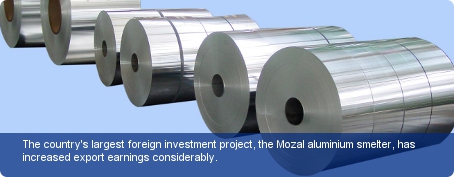Find a business in Mozambique

Mozambique used to be one of Sub-Saharan Africa’s most underdeveloped economies but a booming construction sector and continued growth in agricultural production have helped sustain strong GDP growth of 7% per annum (2008-12). The south-east African country has a GNI per capita of US$510 (2012) but the discovery of large reserves of natural gas and coal has been driving strong growth in the last few years and helped the economy become increasingly resilient to external shocks.
The industry sector contributes about 28% to Mozambique’s GDP (2010). The importance of agriculture is reflected in the food and beverage industry, with the most important product, in terms of commercial value, being beer. In an African context, Mozambique competes strongly in the wood and furniture sector.
The contribution of the agriculture, forestry and fisheries sector together has fallen from about 27% of Mozambique’s GDP in 2007, to 4% in 2010. A significant portion of the agricultural sector is dominated by subsistence farming, with families who seek to sustain themselves, and as a result the percentage of low yielding crops is increasing. Fishing is an important activity and prawns are a major export.
Mozambique has 127.4 billion cubic metres proven natural gas reserves (January 2011 estimate); gas and coal are set to be important exports. The country has abundant and diverse natural resources for mining exploitation, bauxite, graphite, uranium, coal, aluminium and titanium are the greater revenue-generating resources. Research and exploration of underutilised resources are continually being undertaken.
At the time that Mozambique gained its independence from Portugal the country was one of the poorest in the world. To make matters worse the country then became embroiled in a brutal 16-year civil war which virtually wiped its infrastructure. In 1987 the government embarked on a series of macroeconomic reforms designed to stabilise the economy. These steps, combined with donor assistance and with political stability since the multi-party elections in 1994, have led to dramatic improvements in the country’s growth rate.
The introduction of a value-added tax (VAT) and reform of the customs service, have improved the government’s revenue collection abilities. In spite of these gains, Mozambique remains dependent upon foreign assistance for much of its annual budget and the majority of the population remains below the poverty line.
With about 19 airports, 3,123 km of railway, 30,400 km of roads, and 6 ports and harbours, Mozambique has a well-established transport network. The governments of South Africa, Mozambique, and Swaziland are investing in the expansion of the Maputo Corridor and putting in place policies to support private sector investments in order to stimulate sustainable growth and development in the region.
Mozambique is ranked 139th out of 183 countries in the world for ease of doing business, according to the World Bank’s ‘Doing Business 2012’ study. But it is placed fifth best in the sub-Saharan Africa region for protecting investors and seventh best for starting a business. These rankings measure the conduciveness of a regulatory regime in starting and operating a business.
Mozambique has an adult literacy rate of 50.6% (2009) and most of the population speak Portuguese.





